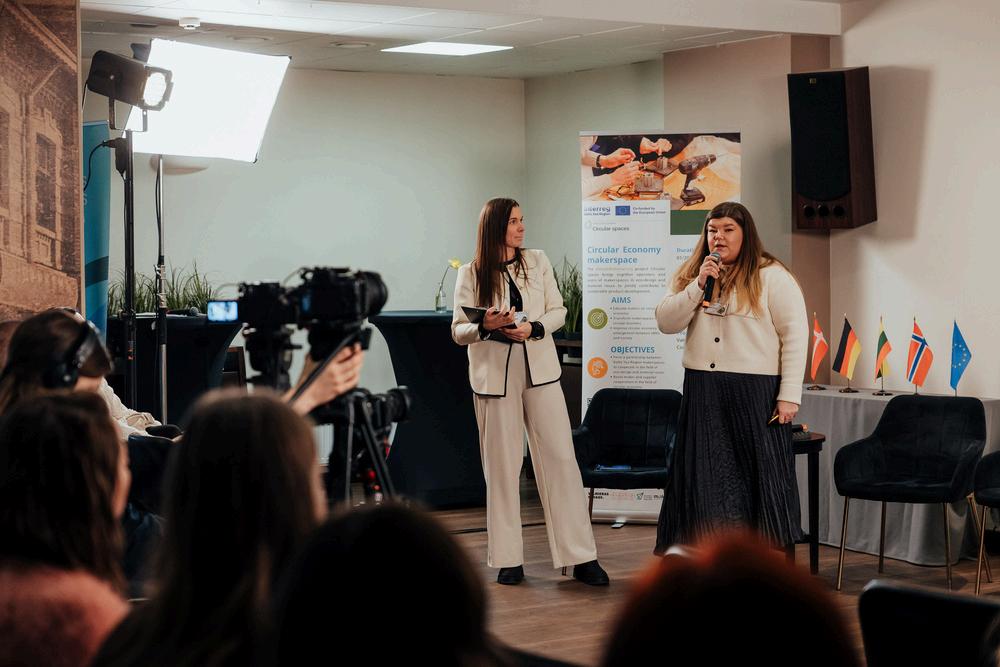




As the project "Circular spaces" draws to a close, we take a moment to reflect on the path we have traveled and the milestones we’ve reached together Over the course of this initiative, we have explored innovative ways to transform makerspaces, rethink and reuse materials, developed practical circular solutions, and strengthened collaboration across borders
From dynamic workshops to the engaging final conference, each activity has brought us closer to our shared goal: strengthening makers and makerspaces for a more sustainable, circular product development. Our project outcomes – from training program and guidelines to digital tool – are now ready to inspire others across the Baltic Sea Region and beyond.
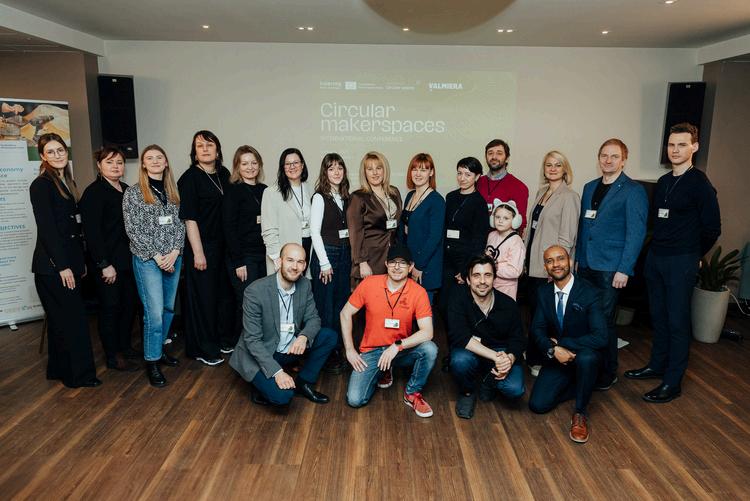
None of this would have been possible without the dedication and collaboration of our partners, stakeholders, and participants To each of you, we extend our heartfelt gratitude Thank you for your hard work, your ideas, and your passion for shaping a more circular future
Though this marks the end of our project, we hope it is just the beginning of continued progress toward circular, sustainable spaces Let’s keep the momentum going!
With appreciation, The "Circular spaces" team
On 5 March, the international conference "Circular makerspaces" took place in Valmiera, bringing together more than 100 participants The event highlighted the role of makerspaces in promoting circular economy principles, encouraging the reuse of materials and developing sustainable innovation
The conference was started with a surprise by the band “Santehniķi”, who performed with plumbing pipes, creating the right mood for a conference with a theme on the circular economy. Afterwards, introductory speeches were given by Evija Nagle, Deputy Executive Director of Valmiera Municipality Government – Head of Development Administration and Ilze Eglāja, Chairperson of the Board of Valmiera Development Agency.
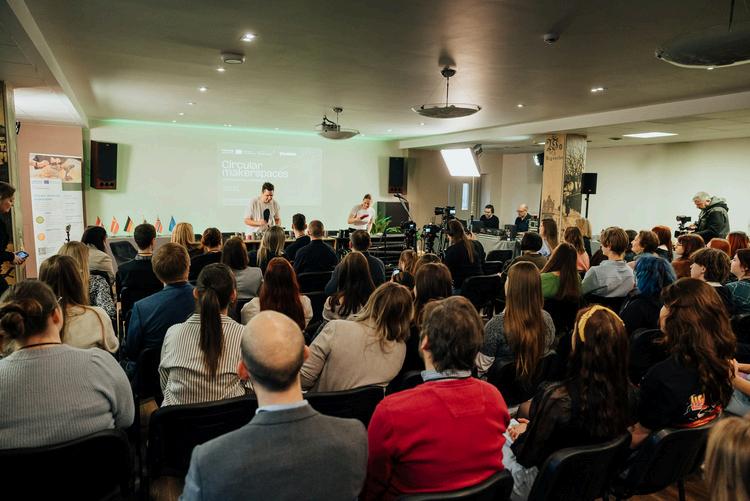
Marija Katrīna Dambe, architect at NOMAD arhitects Ltd, Director of the “Architecture and Construction” study programme at the Faculty of Engineering, Vidzeme University of Applied Sciences, gave a presentation on sustainable construction and the implementation of circular economy principles in the construction sector Marija shared interesting examples from different architectural projects that incorporate sustainable circular economy principles, inspiring local communities to implement creative ideas in construction
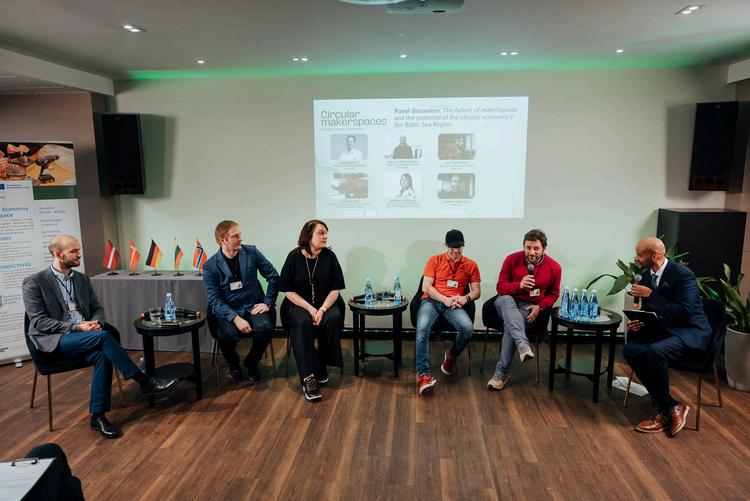
An insight-filled panel discussion with representatives of makerspaces from Latvia, Denmark, Germany and Norway was one of the most anticipated events of the conference programme. The representatives stressed the value of makerspace communities and how it is a huge resource for makers (users of makerspaces) to turn to in order to develop and implement their ideas. Also, in order to promote sustainable ideas, the panellists stressed the importance of educating people about the principles of the circular economy, showing examples and providing materials and equipment to help implement such ideas
The training program developed within the “Circular spaces” project is therefore a particularly valuable resource for strengthening community knowledge on the circular economy
Arno Vaģelis, Project Manager at V.L.T., talked about the company’s activities and the circular economy principles already in place, producing sustainable packaging from recycled paper. The company has taken many steps to add sustainability practices to its production process from different perspectives.
To demonstrate and inspire the participants to create circular products, the conference concluded with a workshop where each participant could create a keyring from reusable materials, thus applying the principles of the circular economy. The workshop was organised by the local makerspace “DARE”.
The recording of the conference is available to everyone on the Valmiera Municipality Government Youtube channel here
Gallery from the conference is available here
Designed for makerspace communities, individuals working in creative spaces who want to implement sustainable practices. It includes makers, students and educators, business support organisations and other interested parties.
The training program is structured into nine comprehensive topics, each focusing on key aspects of the circular economy. Each module has theoretical insights with practical applications, methodological notes and presentation slides to facilitate engaging learning experience
The guidelines are designed to help makerspaces across the Baltic Sea Region integrate circular economy principles into their operations, fostering a more sustainable and resource-efficient environment for innovation and collaboration.
The guidelines contain an overview of the topic, a clear roadmap with ten key aspects, supported by checklists, practical tools and templates,
SWOT analysis canvas, case studies of successfully transformed circular makerspaces.
The digital circular collaboration tool is designed to empower makerspaces, makers, SMEs, start-ups, suppliers and others to share and implement sustainable practices. This tool is designed to help optimize how we approach circularity and sustainability.
The digital circular collaboration tool includes circular maturity test, training program, guidelines, circularity label for products, forum for collaboration
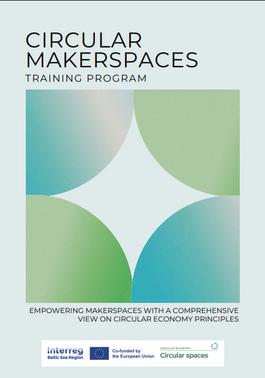
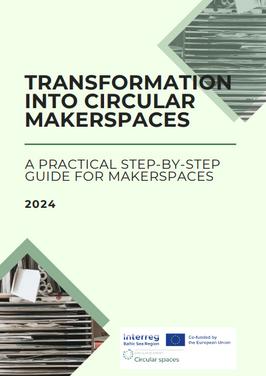
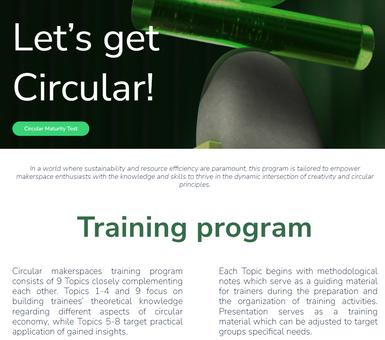
Over the past 50 years, the surge in natural resource consumption and stricter EU environmental regulations have accelerated the need for innovative, resource-efficient solutions The circular economy is no longer optional it is a necessity driven by innovation, responsible consumption, and long-term value creation Experts point to open makerspaces as catalysts for innovation enabling experimentation with secondary raw materials, the creation of durable products, and the development of sustainable production models
Živilė Paužaitė, Head of Quality at Tech-Park Kaunas and a representative of the Interreg Baltic Sea Region (Interreg BSR) program’s “Circular Spaces” project in Lithuania, notes that the outdated ‘make, use, dispose’ model is losing traction among forward-thinking creators and ambitious startups
In open makerspaces, we encounter not only individual creators but also startup teams and experimental artists More and more, we see the implementation of recyclable material usage, the creation of long-lasting products, and the transformation of waste into new production materials. This approach fosters environmental sustainability while redefining economic models through sharing and collaboration.
ŽIVILĖ PAUŽAITĖ, HEAD OF QUALITY AT TECH-PARK KAUNAS
These makerspaces are transforming into hubs for engineering prototypes, sustainable innovation, and cutting-edge design solutions. They encourage responsible resource use while providing opportunities for experimentation by integrating technology with circular economy principles.
Startup communities actively support the development of products and services that incorporate sustainability principles. According to Vaiva Kelmelytė, Director of Operations at Tech-Park Kaunas, EU funding opportunities for circular economy innovation have significantly expanded in recent years.
Europe is enhancing its innovation landscape and fast-tracking the shift to a green and digital economy. This is reflected in the startup community, and projects show that circular economy innovations are not only thriving in local markets but are also being adapted internationally. Beyond mere regulatory compliance, startups are proactively embedding sustainability into their core business models
VAIVA KELMELYTĖ, DIRECTOR OF OPERATIONS AT TECH-PARK KAUNAS
Sustainable business models do more than cut costs - they offer a competitive edge in a global market where responsible innovation is increasingly valued by consumers and partners alike.
PAULIUS
NEZABITAUSKAS, DIRECTOR OF TECH-PARK KAUNAS
According to Associate Professor Dr. Visvaldas Varžinskas, a circular economy expert contributing to “Circular Spaces,” theoretical knowledge alone is not enough for innovation. An ecosystem that fosters experimentation and early-stage prototyping is essential for turning ideas into reality. Universities are ramping up investments in creative and testing infrastructure, actively engaging in open makerspaces where startup teams bring prototypes to life.
It is especially motivating to see young creators and recyclers exploring material circularity, alongside major manufacturers and corporations Companies striving for competitiveness are not only investing in R&D but also providing makerspaces with surplus production materials Materials deemed as waste by businesses find new life in the hands of creators, fuelling the development of innovative prototypes
This approach enables students and researchers to experiment with secondary raw materials, develop sustainable products, and deepen their understanding of responsible resource use. Not only does this contribute to environmental preservation, but it also cultivates a new generation of professionals capable of integrating sustainability principles into their work by driving innovation and the transformation of industries.
For those looking to create more sustainably, we have developed digital tools and methodological resources to facilitate work in circular economy-driven environments. Circular Spaces offers practical tools, clear guidelines, and collaboration opportunities to help makers, startups, and SMEs seamlessly transition to circular production models. These tools empower businesses striving for sustainability to grow and innovate.
A core component of the initiative is a training program for circular creator spaces, addressing nine critical topics in sustainable production and innovation. It includes areas such as circular business models, design-thinking methodologies, and sustainable manufacturing principles. These resources empower creators with the knowledge and tools to seamlessly integrate circular economy principles into their work.
As the shift toward sustainability accelerates, “Circular spaces” stands at the forefront of empowering creators, startups, and innovators to embrace circular economy principles
ŽIVILĖ PAUŽAITĖ, HEAD OF QUALITY AT TECH-PARK KAUNAS
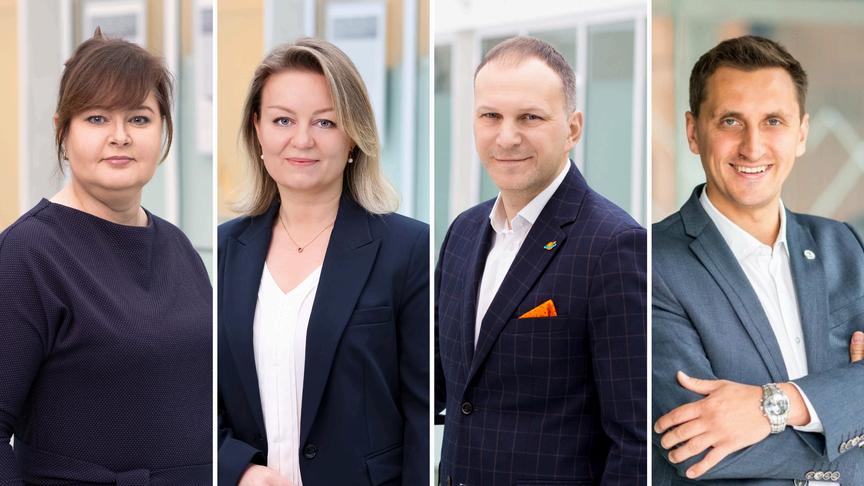
By providing access to digital tools, training programs, and collaborative spaces, the initiative fosters a new generation of forward-thinking professionals who integrate sustainability into their work. With growing global demand for responsible innovation, makerspaces and startups adopting circular production models are not just contributing to a greener future they are shaping the next wave of economic and technological transformation.
Author: Tech-Park Kaunas team
Across the Baltic Sea Region, makerspaces serve as hubs f entrepreneurship. However, many struggle to adopt su economy practices due to limited knowledge, resourc Without a structured approach, valuable materials are wa potential of these spaces remain untapped.
The Circular Spaces project, part of the Interreg B Programme, brought together municipality, makerspac business support organisations across the region. The g turn makerspaces into sustainable, resource-efficient inn embedding circular economy principles into their everyday
Within the project a training program on circular economy developed, guidelines for makerspaces with ten aspects o makerspaces to transition into circular makerspaces w Moreover, a digital circular collaboration tool that now co 100 makers and suppliers to share sustainable practices a launched. Last but not least, five makerspaces across the were transformed to circular makerspaces by adj introducing new equipment and materials.
After the training program was developed, training worksh all 5 makerspaces participating in the project, educatin makers, designers, interested parties and others. One of th was Valmiera makerspace DARE, where more than 1 nd its principle integ
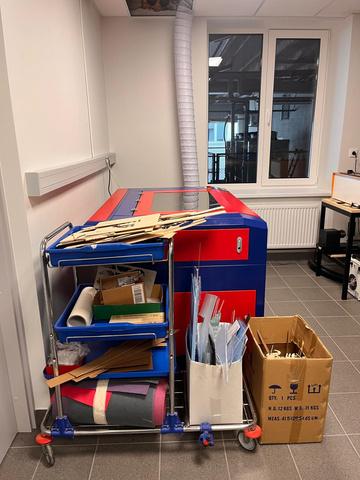
Valmiera Makerspace DARE
Feedback from p overwhelmingly p expressed that the w them explore inno enhance or adapt products to be mo sustainable. Attendee value of not only knowledge but also examples of real com under circular econ These sessions allowe engage hands-on, products from repur which brought the circularity to life.
As part of the project, the Valmiera makerspace DARE a transformation to become a circular makerspace, now pr and space to encourage sustainable and circular appro development
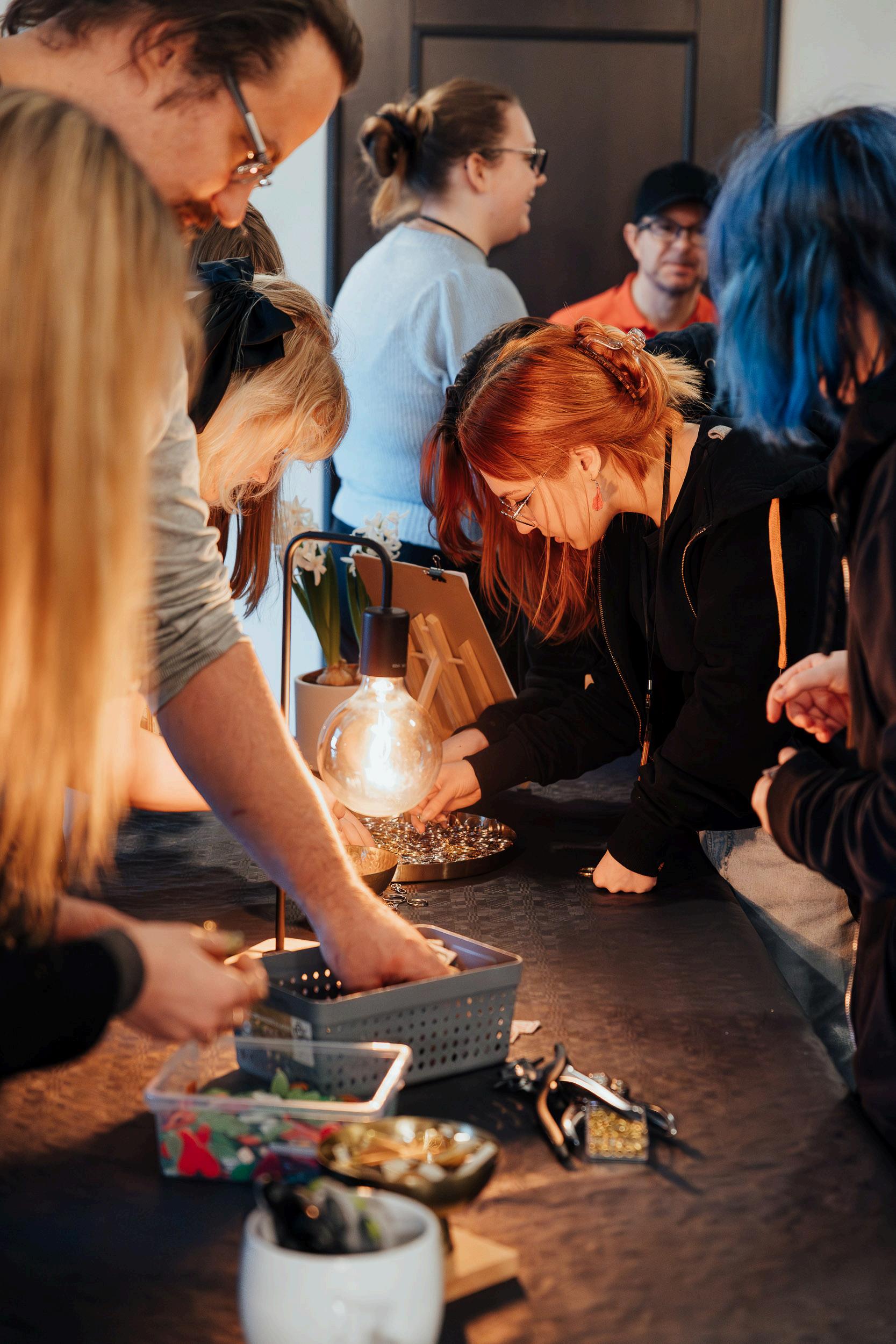

Inspired by the workshops, a team of two designers are now developing new products rooted in circular economy principles. Beyond theoretical understanding, they gained practical insights and access to makerspace’s DARE resources, allowing them to apply circularity in their projects The team benefits not only from the physical space, equipment, and materials at makerspace DARE but also from mentorship by representatives of other makerspaces within the Baltic Sea Region This collaborative environment encourages innovation and provides support at various stages of product development
The designers have been very excited to create in the makerspace and says that even though they came to the makerspace with one idea, they had all the resources available to experiment and figure out the next steps for the products. “For us the biggest benefit in the project was opportunities for experimentation and sustainable creation,” stated Karīna Vītiņa, designer, one of team members. The team also participated in the international conference on 5 March, which took place in Valmiera. Their presentation was inspiring and educational for all listeners.
We can only wish those who are in Valmiera to definitely go to the Valmiera makerspace DARE and use the facilities available if you want to create your own idea for which you don’t really know what technique or technology to use We also recommend using the educational resources developed within the project to gain an understanding of the circular economy, sustainable practices in product development. Be brave and create!
LĪVA BIRKAVA, DESIGNER, ONE OF THE TEAM MEMBERS
The true strength of Circular Spaces laid in its transnational collaboration, which is supported by the Interreg Baltic Sea Region program by providing funding and fostering the cooperation Makerspaces across countries worked together to share experiences, exchange knowledge, and support each other in the transition toward circularity This collective effort meant that no organisation had to start from scratch – what worked in one place became an inspiration for another
